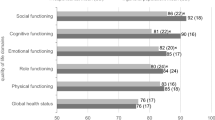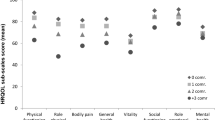Abstract
The objective of this study is to investigate health-related quality of life (HRQoL) in male breast cancer patients. Data of 20,673 patients diagnosed with primary breast cancer (male: n = 84) who completed a questionnaire after discharge from hospital were analysed. HRQoL (SF-36), age, sex, education, native language, insurance status, and partnership status were measured. Cancer staging, treatment (partial mastectomy vs. radical mastectomy), and cancer site were indicated by the clinicians. The HRQoL scores of male breast cancer patients were compared with reference populations. Differences in HRQoL scores between men and women were compared using t tests and regression analysis. Compared to female breast cancer patients, male patients scored significantly higher on seven of eight subscales (physical functioning, role functioning—physical and emotional, bodily pain, vitality, social functioning, and mental health) in the regression analysis. Compared to the reference populations (general male population, men aged 61–70, and the cancer-affected population), male breast cancer patients scored lower on SF-36 subscales on average, with major differences in emotional and physical role functioning. The results suggest that male breast cancer patients may need early interventions that specifically target role functioning, which is severely impaired compared to the male reference population. Future research needs to assess HRQoL with cancer-specific questionnaires and longitudinal designs also focussing on male patients in breast centres.

Similar content being viewed by others
References
Giordano SH, Cohen DS, Buzdar AU et al (2004) Breast carcinoma in men: a population-based study. Cancer 101:51–57
American Cancer Society (2010) Cancer facts & figures 2010. American Cancer Society, Atlanta
Anderson WF, Jatoi I, Tse J et al (2010) Male breast cancer: a population-based comparison with female breast cancer. J Clin Oncol 28:232–239
Stang A, Thomssen C (2008) Decline in breast cancer incidence in the United States: what about male breast cancer? Breast Cancer Res Treat 112:595–596
Contractor KB, Kaur K, Rodrigues GS et al (2008) Male breast cancer: is the scenario changing. World J Surg Oncol 6:58
Rudlowski C (2008) Male breast cancer. Breast Care 3:183–189
Speirs V, Shaaban AM (2009) The rising incidence of male breast cancer. Breast Cancer Res Treat 115:429–430
Tajima N, Tsukuma H, Oshima A (2001) Descriptive epidemiology of male breast cancer in Osaka, Japan. J Epidemiol 11:1–7
Krause W (2004) Male breast cancer-an andrological disease: risk factors and diagnosis. Andrologia 36:346–354
Weiss JR, Moysich KB, Swede H (2005) Epidemiology of male breast cancer. Cancer Epidemiol Biomarkers Prev 14:20–26
Korde LA, Zujewski JA, Kamin L et al (2010) Multidisciplinary meeting on male breast cancer: summary and research recommendations. J Clin Oncol 28:2114–2122
Hodgson NC, Button JH, Franceschi D et al (2004) Male breast cancer: is the incidence increasing? Ann Surg Oncol 11:751–755
Fentiman IS, Fourquet A, Hortobagyi GN (2006) Male breast cancer. Lancet 367:595–604
Brinton LA, Richesson DA, Gierach GL et al (2008) Prospective evaluation of risk factors for male breast cancer. J Natl Cancer Inst 100:1477–1481
Kowalski C, Würstlein R, Steffen P et al (2010) Vier Jahre Patientinnenbefragung im Rahmen der (Re-)Zertifizierung der Brustzentren in Nordrhein-Westfalen. Senologie 7:24–28
Dillman DA (1978) Mail and telephone survey. The total design method. Wiley, New York
Pfaff H, Freise D, Mager G et al (2003) Der Kölner Patientenfragebogen (KPF): Entwicklung und Validierung eines Fragebogens zur Erfassung der Einbindung des Patienten als Kotherapeuten. Sankt Augustin, Asgard-Verlag
Kowalski C, Nitzsche A, Scheibler F et al (2009) Breast cancer patients’ trust in physicians: the impact of patients’ perception of physicians’ communication behaviors and hospital organizational climate. Patient Educ Couns 77:344–348
Bullinger M, Kirchberger I (1998) SF-36. Fragebogen zum Gesundheitszustand. Handanweisung. Hogrefe-Verlag, Göttingen
Sobin LH, Wittekind C (2002) UICC TNM classification of malignant tumors, 6th edn. Wiley, New York
Avis NE, Crawford S, Manuel J (2005) Quality of life among younger women with breast cancer. J Clin Oncol 23:3322–3330
Mowry SE, LoTempio MM, Sadeghi A et al (2006) Quality of life outcomes in laryngeal and oropharyngeal cancer patients after chemoradiation. Otolaryngol Head Neck Surg 135:565–570
Major MS, Bumpous JM, Flynn MB et al (2001) Quality of life after treatment for advanced laryngeal and hypopharyngeal cancer. Laryngoscope 111:1379–1382
LoTempio MM, Wang KH, Sadeghi A et al (2005) Comparison of quality of life outcomes in laryngeal cancer patients following chemoradiation versus total laryngectomy. Otolaryngol Head Neck Surg 132:948–953
Acknowledgments
The patient survey was requested and initiated by the North Rhine Westfalian Ministry of Work, Health and Social Affairs (MAGS NRW). The costs were borne by the participating hospitals as part of the breast centre certification and benchmarking process. The hospitals asked the patients to consent to participation in the study and indicated disease characteristics as reported. Neither the ministry nor the hospitals were involved in the analysis or interpretation of data, in the writing of the report, or in the decision to submit the paper for publication.
Conflict of interest
The authors declare that they have no conflict of interest.
Author information
Authors and Affiliations
Corresponding author
Rights and permissions
About this article
Cite this article
Kowalski, C., Steffen, P., Ernstmann, N. et al. Health-related quality of life in male breast cancer patients. Breast Cancer Res Treat 133, 753–757 (2012). https://doi.org/10.1007/s10549-012-1970-3
Received:
Accepted:
Published:
Issue Date:
DOI: https://doi.org/10.1007/s10549-012-1970-3




